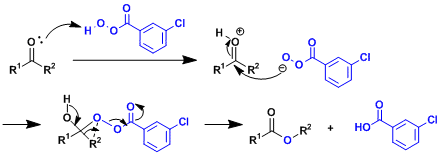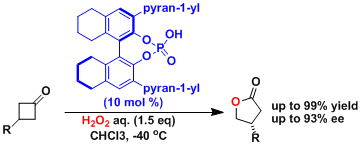- Generality
- Reagent Availability
- Experimetal User Friendliness
- Criteria #4
- Criteria #5
-
General Characteristics
-The conversion of ketones into esters by oxidation using peracids is called the Baeyer-Villiger reaction. In unsymmetrical ketones, the more substituted (the more electron-rich) alkyl group migrates onto the oxygen. The stereochemistry at the migrating carbon is preserved.
-More acidic peracids tend to be more reactive in mediating the Baeyer-Villiger oxidation. The order of reactivity is CH3COOOH < C6H5COOOH < mCPBA < p-NO2C6H4COOOH < CF3COOOH, among which mCPBA is used most commonly because of the ease of handling and its wide availability.
-
General References
・Baeyer, A.; Villiger,V Chem. Ber. 1899, 24, 3625. doi:10.1002/cber.189903203151
・Baeyer, A.; Villiger,V Chem. Ber. 1900, 33, 858. doi:10.1002/cber.190003301153
・Hassall, C. H. Org. React. 1957, 9, 73.
・Krow, G. R. Tetrahedron 1981, 37, 2697. doi:10.1016/S0040-4020(01)92337-3
・Krow, G. R. Comp. Org. Syn. 1991, 7, 671.
・Krow, G. R. Org. React. 1993, 43, 251.
・Review: Renz, M.; Meunier, B. Eur. J. Org. Chem. 1999, 737. [abstract]
・Review: ten Brink, G.-J.; Arends, I. W. C. E.; Sheldon, R. A. Chem. Rev. 2004, 104, 4105. DOI: 10.1021/cr030011
-
Reaction Mechanism
Ref: J. Am. Chem. Soc.1972, 94, 4189; J. Org. Chem. 2007, 72, 3031.

-
Examples
The configuration of the migrating carbon is retained.[1]

The more electron-rich carbon migrates preferentially.[2,3]


Benzaldehyde derivatives, which are readily accessible (e.g. by the Vilsmeier reaction), are oxidized under Baeyer-Villiger conditions to give phenols after hydrolysis (the Dakin reaction).[4]

An application in Kishi’s total synthesis of tetrodotoxin.[5]

Asymmetric Baeyer-Villiger reaction catalyzed by the chiral phosphoric acid.[6]

-
Experimental Procedure
-
Experimental Tips
-
References
[1] 大学院講義有機化学II P180
[2] Lawlor, M. D.; Lee, T. W.; Danheiser, R. L. J. Org. Chem. 2000, 65, 4375. DOI: 10.1021/jo000227c
[3] Hassner, A.; Pinnick, H. W.; Ansell, J. M. J. Org. Chem. 1978, 43, 1774. DOI: 10.1021/jo00403a032
[4] Dakin, H. D. Am. Chem. J. 1909, 42, 477.
[5] Kishi, Y.; Fukuyama, T.; Aratani, M.; Nakatsubo, F.; Goto, T.; Inoue, S.; Tanino, H.; Sugiura, S.; Kakoi, H. J. Am. Chem. Soc. 1972, 94, 9219. DOI: 10.1021/ja00781a039
[6] Ding, K. et al. Angew. Chem. Int. Ed. 2008, 47, 2840. DOI: 10.1002/anie.200705932
-
Related Books

